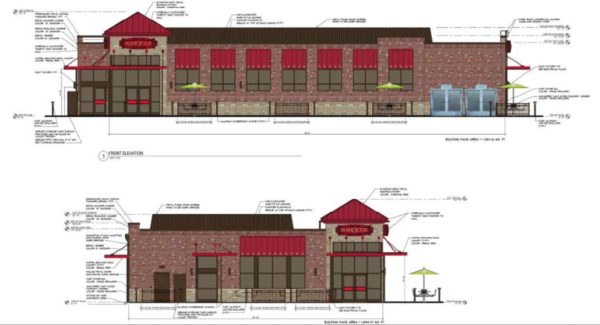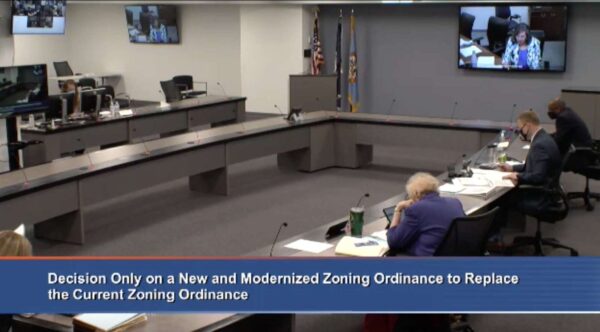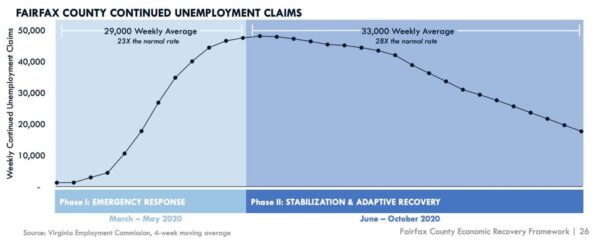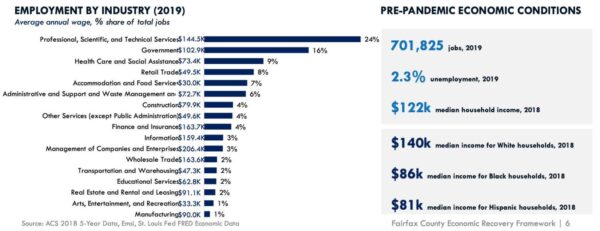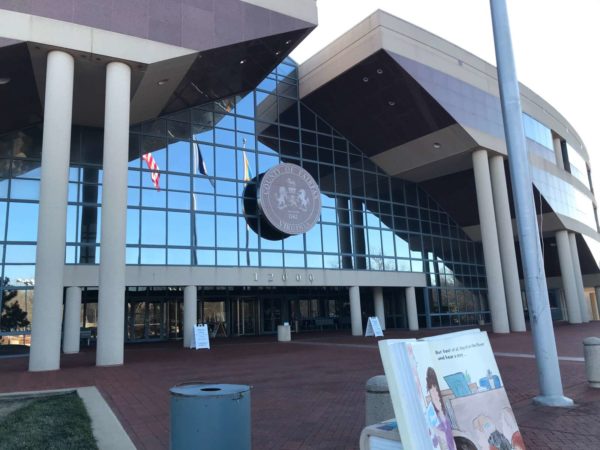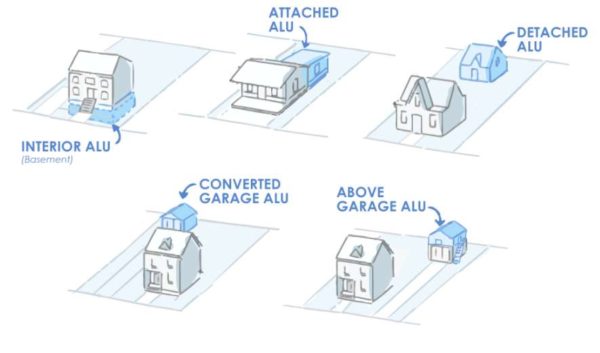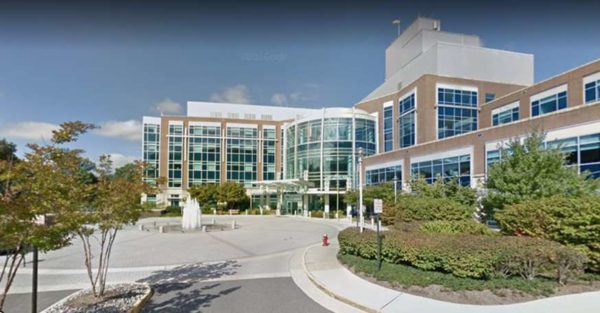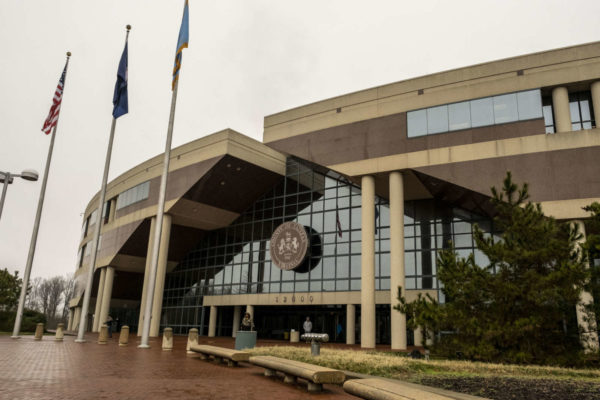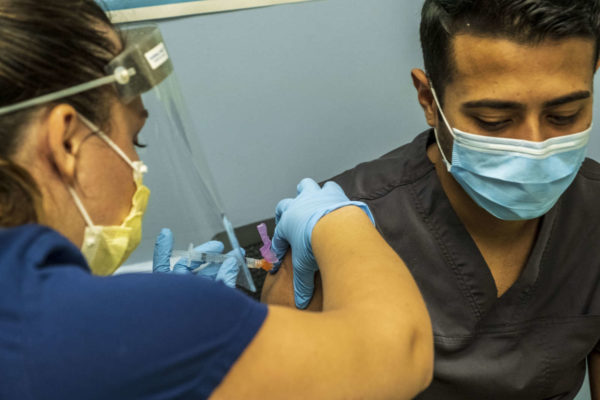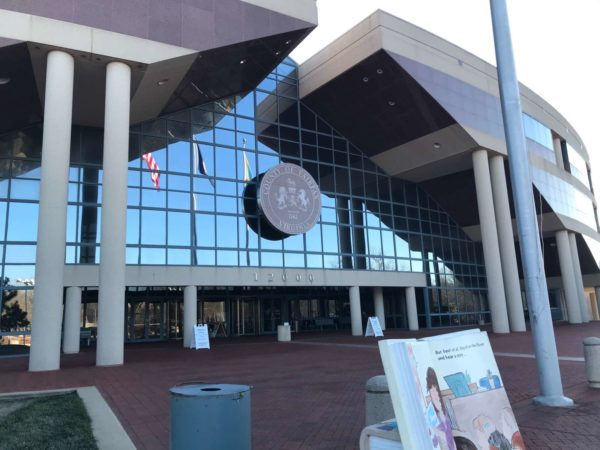
Fairfax County’s government workers union urged the Board of Supervisors yesterday (Tuesday) to adopt a fiscal year 2022 budget that includes increased compensation for employees, whose year-long pay freeze would be prolonged if the county’s proposed budget takes effect.
The testimony came during the first of three public hearings on the advertised FY 2022 budget that have been scheduled for this week. There will also be hearings at 3 p.m. today and tomorrow (Thursday).
Service Employees International Union Virginia 512, which represents social workers, librarians, maintenance staff, and other general county government employees, says that its top priorities for the new budget are ending the pay freeze and establishing rules for collective bargaining.
“For over one year, we have worked tirelessly to keep the community running,” SEIU Virginia 512 President Tammie Wondong said. “We have done everything we can to keep Fairfax families healthy and safe, even when we have not been healthy and safe ourselves. Today, we are asking that you recognize and value county employees in this year’s budget.”
Wondong acknowledged that the county has made an effort to support employees during the COVID-19 pandemic by expanding leave options and providing hazard pay. The board is also considering offering one-time bonuses in the FY 2021 budget as part of its third-quarter review, which will be approved on April 27.
However, the union argues that that remains insufficient compensation for employees who are essential to maintaining county services but often struggle with the rising costs of housing, healthcare, and other needs.
Fairfax County Health Department employee Jenny Berkman-Parker said in a video that played during the public hearing that the most recent evidence of the ongoing pay freeze’s impact on her family came in the form of an email from her son’s university, which announced that it will raise tuition costs by 5% next year.
“I was trying to be understanding the first year. The second year is definitely more stressful,” she said. “…Now that we’re having pay freezes for two years in a row and we’ve had pay freezes in the past, my income is no longer keeping up with the cost of living.”
Fairfax County Public Schools employees would also have their pay frozen again under the advertised FY 2022 budget. The Fairfax County School Board requested a 3% pay raise for all employees, but that was not incorporated into the county’s proposal, which increases funding for the school system by just $14.1 million.
The Fairfax County Federation of Teachers, which represents all non-administrative FCPS staff, said in a press release issued on Monday (April 12) that 60% of respondents to a poll it conducted reported living paycheck to paycheck. Three out of four respondents said they have considered leaving for another school district due to the pay freeze.
“These statistics should not be the case in one of the wealthiest districts in the Commonwealth,” FCFT President Tina Williams said. “…Our district and county must do better.”
County Executive Bryan Hill’s proposed budget largely limits spending in response to the ongoing demands of the pandemic and uncertainty about the county’s future recovery.
When he presented his proposal on Feb. 23, Hill told the Board of Supervisors that it would cost more than $55 million to fund the county’s employee compensation program, including almost $30 million for a 2% market rate adjustment.
He recommended reducing the real estate tax rate by one cent to provide some relief to property owners, though rising home values mean that residents will still see a 4.25% increase in their tax assessments on average. The Board of Supervisors voted on March 9 to advertise a flat rate of $1.15 per $100 of assessed value as the ceiling for the new rate.
The question of how to support county services and workers while giving taxpayers some relief has formed the crux of the community conversation around the FY 2022 budget.
“So many folks in Fairfax County are hurting. The last thing they need is a tax increase,” said Fairfax County Republican Committee parlimentarian James Parmalee, the lone speaker at Tuesday’s public hearing on the tax rate.
Residents expressed differing points of view on whether the tax rate should be lowered at a town hall on the proposed budget hosted by Hunter Mill District Supervisor Walter Alcorn on March 29.
One resident, who identified herself as a county employee, said that she was disappointed at the potential extended salary freeze, while another resident worried that climbing housing values will exacerabate the county’s affordability issues.
The Board of Supervisors will mark up the budget proposal on April 27 before adopting an approved budget on May 4. Fiscal Year 2022 begins on July 1.
Developers broke ground yesterday (Wednesday) on a much-discussed new senior living community in Great Falls.
Slated to open in the summer of 2022, The Residence of Colvin Run at 1131 Walker Road will be a 53,000 square-foot facility set on 2.8 acres. It’s about a half-mile from the Colvin Run Mill historic site.
The senior living facility will offer 62 single and double occupancy units for adults 65 and older. That includes 44 assisted living apartments and 18 memory care residences.
Amenities will include an art studio, a theater designed for the hearing-impaired, several dining venues, an open-hearth brick oven, and a trail connecting to neighborhood businesses.
In terms of staffing, about 60 employees are expected to be on payroll, operator IntegraCare tells Reston Now.
Renderings depict an architecture that seems similar to a small cottage or a Craftsman-style look with lots of brick and wood.
Senior living facilities of this nature are becoming more in demand as the area’s population ages. In opening remarks, it was noted that nearly 34% of the Great Falls population is over 55 years old.
“In our experiences, we’ve found that seniors want to continue to live in the communities that they raised their families in,” IntegraCare CEO Larry Rouvelas said at the groundbreaking ceremony. “The need to build senior housing communities in the specific neighborhoods that people grew up in is an important part of their quality of life.”
IntegraCare also operates a senior living facility in Hunters Woods on Colt Neck Road.
Dranesville District Supervisor John Foust has been a consistent supporter of the project, stating that the development fulfills three of his goals for the district and Fairfax County at large.
“First of all, we’re very interested in economic development. This is a business. Secondly, we have a large population that’s aging, and this is a fantastic facility for them to age,” Foust said. “And third, from a land-use standpoint, it’s a beautiful building that’s going to fit into the character of Great Falls and make it even better.”
He also emphasized the concept of “placemaking,” as in providing amenities and creating a community that attracts companies and a workforce.
“It used to be that you built a factory and people came to that factory to work. Today, we build a community that people want to live in. The [workforce] comes to you and the employers come to them,” Foust said.
Foust also believes a greater supply of senior living options will be needed throughout Fairfax County in the future, since the county as a whole is getting older.
According to the county’s latest demographic information, about 14% of county residents — or 164,000 people — are 65 years old or older.
By 2025, that number is expected to tick up by 30,000 people and encompass 16% of the county’s total population. In 2035, as much as 17.5% of county residents — a total of 226,000 people — could be 65 or older.
“The aging of the population has created a need. Fortunately, we have developments like this one to try to meet that demand,” Foust said. “But demand right now far exceeds any supply that we’ve been able to create. So, it’s great to see this type of development occurring across the county for the foreseeable future.”
Construction on The Residence of Colvin Run is expected to take 15 months, with an additional two months for permitting. That puts the opening somewhere between July and September of 2022.
Work on the facility’s footings and foundations will commence in about a month, and then, in about three months, residents and passersby will see a steel frame being erected. The exterior skin will go on after that.
The Fairfax County Board of Supervisors has approved the plan to bring a Sheetz to Herndon, the first of its kind in the county.
First reported in February 2020, the 6,007 square-foot Sheetz will be built at 13850 McLearen Road.
But the approval at Tuesday’s (March 23) County Board meeting comes even though there were stated misgivings about the company’s refusal to go through the LEED-certification process.
Despite the county requesting that Sheetz commit to LEED-certification or an equivalent program, the company declined.
The reason, as a company spokesperson stated during the meeting, was that verification was a “very time consuming and burdensome process.” The company did promise to adhere to other green building commitments.
This reasoning didn’t sit well with a number of supervisors, noting that it set a bad precedent for others looking to get approval to build in the county.
The county, as well as neighboring jurisdictions, have prioritized LEED-certification as a means of meeting long-term goals of cutting carbon emissions.
Supervisor James Walkinshaw also noted that building another gas station in Fairfax County “perpetuates our addiction to fossil fuels” and will be a decision we regret with “what all the world knows about the climate crisis.”
However, a majority of the County Board still approved the building of a Sheetz food store, gas station, and restaurant with a drive-through.
In total, 8 supervisors voted yea, one nay (Supervisor Walkinshaw), and one abstained (Supervisor Storck).
The company representative at the meeting noted this will be the first Sheetz location in Fairfax County.
With the approval, Reston Now has reached out to Sheetz about a timeline for construction and an estimated opening date. We have yet to hear back as of publication.
The Sheetz will occupy a roughly 2.7-acre parcel of land that will soon be vacant after the demolition of a two-story office building and surface parking lot. That building was constructed in 1977.
The Sheetz will operate 24 hours a day, seven days a week. There will be 49 car parking spots, five of which will be reserved as electric vehicle charging stations.
The building is set to be constructed with materials including brick veneer facade with cast stone masonry.
County staff asked for high quality landscaping” so the development is “attractive” in its “highly visible site” along McLearen Road.
Photo via handout/Fairfax County Planning Commission
The Fairfax County Board of Supervisors voted yesterday (Tuesday) to approve changes to the county’s zoning ordinance intended to make the codes easier to navigate and understand.
The 7-3 vote — with Supervisors Walter Alcorn, Daniel Storck, and Pat Herrity dissenting — serves as the culmination of a four-year Zoning Ordinance Modernization Project, or zMOD, that began in 2017 to update zoning laws codified in 1978.
Although the updates to the document were sweeping in scope, three proposed changes drew a great deal of public attention and comment. These included proposals to loosen restrictions on accessory living units and home-based businesses and revise size and height regulations for flags and flag poles.
“There are…very few issues receiving much attention,” Dranesville District Supervisor John Foust said. “I believe that demonstrates that, given everything that we’ve done, it was a fair and transparent process.”
Storck, who represents the Mount Vernon District, said he supports many aspects of the 614-page draft, but a few areas surrounding the accessory living units and the home-based businesses, including the permit process and enforcement, give him pause.
He worries that some of the proposed changes to require only administrative permits could lead to a lack of engagement and that enforcement, which he calls “the bread and butter of public confidence,” is not going to be swift or strong enough to stop zoning violations.
Approved changes to the regulations for accessory living units include allowing interior units with an administrative permit and removing the requirement that only those 55 and older or disabled people can live in them. However, the owner must live in the main home, can only operate one ALU in which up to two people can reside, and must provide a parking spot.
To operate a home-based business, people will need to get special exception permits to have customers visit between 8 a.m. and 9 p.m., unless they provide instruction to fewer than eight students a day and up to four at a time.
Acceptable businesses include retail — as long as sales and delivery occur online or offsite — as well as exercise classes, repair services for small household items, hair salons, and clothing tailors. People can also operate an office or as a music, photography, or art studio out of their home.
Residents can have up to three flags, and flag poles can be up to 25 feet tall when in front of a single-family home or up to 60 feet tall on other lots. Property owners can apply for a special permit to extend the height of a pole.
The board opted not to adopt any regulations limiting the size of flags.
In voting for the final draft of the plan, Providence District Supervisor Dalia Palchik said the document represents a compromise that goes “further than some would like to go, but not as far as others would like.”
The supervisors highlighted the Herculean effort that went into overhauling codes for a county as large as Fairfax and taking into account community input. Foust said that the most recent draft, which was subject to a public hearing on March 9, “includes revisions that significantly improve the initial package that we considered.”
Board of Supervisors Vice Chair Penelope Gross said that home-based businesses and accessory living units are both “already here,” so the changes help clarify what is allowed and set guardrails to preserve neighborhoods and allow people to work from home.
“I know there’s a lot of speculation about what will happen. Speculation is usually just that: speculation,” she said. “It sometimes is fear.”
Palchik said she does not discount the people who expressed legitimate concerns, but she argued that many of those have been addressed during the zMOD process. She aargued that many of the changes are similar to, if not “much more modest” than policies that are already in place elsewhere in the D.C. area, including in Montgomery County, D.C., Arlington, Loudoun County, and the City of Alexandria.
“While there are many changes to the zoning ordinance, I do believe it’s critical in seeing that our housing market is under pressure and costs of living continue to rise, especially for those who struggle to live here,” she said. “While accessory living units do not fix all of these problems, the added flexibility for our most vulnerable residents and additional options for those who want to remain in their homes can be part of the solution.”
Photo via Fairfax County
Virginia to Further Ease COVID-19 Restrictions in April — “As COVID-19 vaccinations continue to rise in Virginia, certain sports and entertainment venues may begin to operate with additional capacity and indoor and outdoor gathering limits will increase starting Thursday, April 1…More than two million Virginians, or approximately one in four people, have now received at least one dose of the COVID-19 vaccine.” [Gov. Ralph Northam]
Fairfax County Board Adopts Resolution Condemning Anti-Asian Racism — The Fairfax County Board of Supervisors voted unanimously yesterday to adopt a resolution condemning “all bigotry, harassment, and hate violence directed at Asian Americans in our community.” [Chairman Jeff McKay]
Access to DC Cherry Blossoms Limited — The National Park Service will limit pedestrian and vehicle access to the Tidal Basin, East Potomac Park and West Potomac Park during the peak of the bloom period. [Patch]
Photo via vantagehill/Flickr
A consultant is recommending a dozen ways Fairfax County can uplift people whose livelihoods have been harmed by the pandemic in the short-term and promote long-term economic resilience.
Specific short-term measures include launching “Buy Local” and “Made in Fairfax” campaigns, focusing on women- and minority-owned businesses, and finding ways to reduce rent or other costs for struggling small businesses.
Other recommendations target those hit hardest — including people without high school degrees, women with children, and people of color — with services like career centers, workforce training programs, and affordable childcare.
“A lot of these things have ongoing aspects, but tying them together and focusing on economic recovery is really going to be an effective approach,” Dranesville District Supervisor John Foust said.
County staff presented plans for implementing the consultant’s recommendations and assisting small businesses during the Fairfax County Board of Supervisors economic initiatives committee meeting on Tuesday (March 16).
Fairfax County has up to $15 million in reserves to support economic recovery efforts and could also use some of the anticipated $222.56 million in federal funds coming from the American Rescue Plan, according to Foust, who chairs the committee.
Hunter Mill District Supervisor Walter Alcorn called the staff proposal “fantastic” but added that transportation — which did not figure into staff planning — should play a role in the county’s recovery efforts.
“Since we’re doing something new, I would just recommend putting more structure into collaboration across agencies,” Providence Supervisor Dalia Palchik said.
Fairfax County hired the consultant HR&A last summer to analyze how the COVID-19 pandemic has affected its economy and what the county government could do to expedite a more just recovery. More than 65 organizations and small businesses participated in the study, providing input on perceived barriers to and strategies for economic recovery.
According to the consultant’s report, before COVID-19, flourishing technology and government sectors contributed to a decade of strong economic growth for Fairfax County. The total number of jobs grew by 9% annually, and employment had reached its lowest level since the Great Recession.
In 2018, the county had the third-highest median household income in the D.C. area, but significant racial disparities lurked just below the surface: The median household income for white residents was about $140,000, exceeding that of Black households (~$86,000) and Hispanic households (~$81,000).
The pandemic reversed that job growth and exacerbated the existing disparities.
Through December 2020, Fairfax County lost an estimated 48,200 jobs, mainly in food service, hospitality, retail, and the arts. Small businesses in these three sectors will have a particularly long road to recovery, HR&A said.
The consultant also reported that job losses were most acutely felt by low-income people, people of color, and people with lower levels of formal education and training, which will make “the road to economic stability longer and more challenging.”
The job market appears to have settled down since the upheaval of the pandemic’s early days, when initial unemployment claims in Fairfax County soared to a high of 21,302 filings during the week of April 4. The Virginia Employment Commission reported today that 543 people filed new claims for the week of March 6, though the numbers ticked back up over 1,000 for multiple weeks over the winter.
HR&A outlined several ways Fairfax County can facilitate job opportunities for those suffering the most, namely, getting people who lost jobs in hard-hit industries access to jobs in industries that have weathered the pandemic better, including government and technology.
In the short-term, HR&A recommends Fairfax County employ artists to design public service announcements or put on performances. The county could also hire workers to fill temporary needs like contact-tracing, while partnering with the private sector to place people in long-term jobs.
Home to more than 8,900 technology-focused businesses, Fairfax County could pursue policies that support workforce training in health technology, digital services, and green jobs. Given its proximity to D.C., Fairfax County will continue attracting government workers, so the county should keep expanding the workforce pipeline for government and contracting work, the firm said.
The workforce will likely need skills training to acquire new qualifications, as well as equal digital access and digital literacy and adequate childcare access. This will require investing in job centers, improving certification and training programs, and making it easier to connect people with county and private services, HR&A writes.
In the long-term, the consultant recommends Fairfax County continue efforts such as easing online permitting processes and contributing to affordable housing.
Photo via Tim Mossholder on Unsplash
The Fairfax County Board of Supervisors unanimously agreed to defer a vote on adopting a new county zoning ordinance after hearing roughly five hours of testimony at a public hearing on Tuesday (March 9).
The fate of the 614-page document will now be decided at 4:30 p.m. on March 23.
“We’ve been at this for a long time,” Sully District Supervisor Kathy Smith said toward the end of the public hearing, which featured 71 speakers. “…By deferring for two weeks, that gives the board more time to consider what we’ve heard before we move on this on March 23.”
The additional time will let the board review input from the community and the Fairfax County Planning Commission, which put forward amendments last week related to flags and flag poles, home-based businesses, and accessory living units (independent housing on the same property as a main residence).
“I think we might have a fairly long mark-up on this, because my guess is there are going to be a number of issues, as a board, we might need to talk through,” Hunter Mill District Supervisor Walter Alcorn said.
Launched in 2017, the Fairfax County Zoning Ordinance Modernization project (zMOD) aims to update the county’s 40-year-old zoning code by making it easier to comprehend and incorporating new activities, such as electric vehicles and community gardens.
Proposed regulations on ALUs, home-based businesses, and flags have emerged as the most hotly contested changes, though speakers at Tuesday’s public hearing raised concerns about everything from food trucks to vehicle storage.
Fairfax County staff agreed with the planning commission that the draft should have a requirement that home-based businesses be approved by the county health department if the property has a well or septic system and a standard limiting the amount of hazardous materials they can have on site.
They also revised their recommendation for flags to allow maximum sizes of 50 square feet on lots with single-family dwellings and manufactured homes or 150 square feet for all other uses. Staff previously recommended limiting flag sizes to 24 square feet on single-family home lots and 96 square feet for other uses.
Community members took stands on both sides of the debate around ALUs. Some voiced support for looser regulations to enable them as an affordable housing option, while others worried about the potential impacts on traffic, parking, and public facilities.
“There is no guarantee that ALUs will equal affordable housing, but eliminating the current requirements will tax our already burdened public facilities,” McLean Citizens Association President Rob Jackson said. “…Adding more people without additional public facilities will degrade the quality of life.”
Many speakers urged the Board of Supervisors to follow the planning commission’s recommendation of retaining a special permitting process for interior ALUs, saying that allowing administrative permits would shut out citizens and neighbors.
“We really need more genuine outreach to engage the public in making land use decisions that directly affect communities, and not less,” Falls Church resident Kathryn Cooper said. “Residents do not want their involvement in land use decisions to be excised, as will occur under zMOD.”
Also a Falls Church resident, Coalition for Smarter Growth Northern Virginia Advocacy Manager Sonya Breehey argued that the county should go further in encouraging ALUs and that continuing to require a special permit for interior units, as recommended by the planning commission, would delay efforts to address housing affordability challenges.
“Accessory living units can offer less expensive housing options than renting or buying a single-family home because of their smaller size, and they provide housing opportunities in communities that might otherwise be too expensive,” Breehey said. “…As a homeowner in a single-family residential neighborhood, I want you all to know that I see ALUs as an opportunity to provide greater inclusivity in my neighborhood that I love.”
The Fairfax County Planning Commission voted unanimously on Wednesday (Mar. 3) to recommend that the county replace its current zoning code with a new draft resulting from the Zoning Ordinance Modernization Project (zMOD) that has now been underway for almost four years.
The 12-0 vote came after more than an hour of debate over the county’s proposed regulations for accessory living units(ALUs) — independent residential units located on the same property as a primary dwelling — and home-based businesses, which have emerged as two of the most contentious components of the 614-page document.
“The zMOD result on ALUs and home-based businesses, I believe, misses the mark,” Mason District Commissioner Julie Strandlie said. “It does not incorporate community concern and avoids a significant opportunity to make a real difference in housing policy. If we want to successfully expand housing options, we need community input, involvement, and buy-in.”
Released on Feb. 17, the draft zoning ordinance crafted by county planning staff and the consultant Clarion proposed allowing ALUs for single-family detached dwellings with an administrative permit if they meet certain requirements, including a maximum gross floor area of 800 square feet or 40% of the principal dwelling and that an occupant be at least 55 years old or have a disability.
Citing an “exceptional amount” of public opposition to that proposal, including at a public hearing on Jan. 28, the planning commission recommended that the Fairfax County Board of Supervisors instead utilize a special permit review process for all ALUs, which requires property owners to notify neighbors and make their case at a public hearing.
“This [administrative] process — what I’m seeing and what I’ve personally experienced — it pits neighbor against neighbor, or potentially could put neighbor against neighbor,” Mount Vernon District Commissioner Walter Clarke said. “I think it’s only fair, and we owe it to the citizens of this community, to have a process whereby they still can be engaged.”
The commission also recommended lifting the requirement that an occupant have a disability or be 55 years or older when an ALU is approved with a special permit, and allowing units to fill a basement or cellar based on its existing size on the date the new zoning ordinance becomes effective.
The commission also recommended amending the draft to prohibit on-site customers for home-based businesses approved through an administrative permit, except in cases involving instructional activities at a “specialized instruction center” — i.e., private tutoring or music lessons — or a health and exercise facility.
Instruction centers and health and exercise facilities could have up to four students at a time and eight students in a day. Other home-based businesses could have customers if they obtain a special permit.
In addition, all home-based businesses will have to be approved by the Fairfax County Health Department if there is a well or septic tank on site, a provision that was already proposed for ALUs.
While acknowledging that ALUs could help people who otherwise might not be able to afford to live in Fairfax County, the majority of commissioners ultimately expressed reservations about loosening restrictions across the entire county without getting a clearer sense of the potential impact on traffic, parking, and other issues, especially in high-density areas.
“While I do believe that accessory living units can provide an opportunity for additional living space in our very expensive county, I believe additional time is needed for study of the proposed countywide applications of accessory living units by administrative review,” At-Large Commissioner Timothy Sargeant said.
The commission recommended that the Board of Supervisors direct the county planning department to convene a task force that will study ALUs and home-based businesses for 18 months and deliver a report with any recommendations for further changes to the zoning ordinance.
Earlier in the meeting, the commission shot down a proposed zoning amendment that would have altered regulations for flags and flag poles, calling it “a solution in search of a problem.” The county’s only existing regulation for flags is a limit of three per lot.
Fairfax County launched its zMOD initiative in March 2017 with the goal of simplifying and updating a document that had not undergone a comprehensive revision since it was first adopted 40 years ago.
The Board of Supervisors is scheduled to hold a public hearing on the new zoning ordinance on Tuesday (Mar. 9). If the ordinance is adopted as it was approved by the planning commission, it would take effect at 12:01 a.m. on July 1.
Image via Town of Vienna
Updated at 5:30 p.m. — Inova Health Systems does not conduct credit checks when people looking to schedule a COVID-19 vaccine appointment create an account on its MyChart patient portal, a spokesperson told Tysons Reporter, Reston Now’s affiliate site.
The spokesperson clarified that Inova does an identity verfication check to ensure that patient information is accurate since the healthcare system is working off of the Fairfax County Health Department’s registration queue.
Inova also says that people have the option to upload a photo of their health insurance card, but it is not required to create a MyChart account.
“There’s nothing more important to us than vaccinating as many people as possible, but we need to make sure we’re doing so in a safe, reliable, and secure way,” Inova Chief Communications Officer Tracey Schroeder said, noting that Inova has administered a total of over 186,000 COVID-19 vaccine shots.
Inova says MyChart gives it a way to confirm patient identities and report data on COVID-19 vaccinations to the Virginia Department of Health as required by the state.
Earlier: While Fairfax County has smoothed out many of the issues that plagued the early rollout of its COVID-19 vaccine registration system, frustrations have now emerged around a key partner in the county’s vaccination efforts: the Inova Health System.
Eligible Fairfax County residents can get in line for a vaccine appointment with Inova by pre-registering through the county’s health department, but to actually schedule the appointment, the healthcare system requires that individuals create an account for its MyChart patient portal, a process that county leaders say is overly demanding in the type of information people are expected to provide.
During a health and human services committee meeting on Tuesday (Mar. 2), the Fairfax County Board of Supervisors urged county staff to work with Inova to address concerns about its scheduling process, which Providence District Supervisor Dalia Palchik said seems to be “a bit more intrusive in their questions.”
“If you go through the county, it’s a beautiful process at this point. If you go through Inova, it is very troubling,” Dranesville District Supervisor John Foust said. “Some people are refusing to go through that process, and that just puts it back on our health department to try to figure out what to do with those people, so something needs to be done.”
To create a MyChart account, users must undergo a credit check and upload a photo of their health insurance card, which could be challenging for people who don’t have a smartphone or are inexperienced with using that technology. (Correction: Inova says that it conducts a patient identity check, not a credit check, and that the option to upload a photo of a health insurance card is not mandatory)
The sign-up form also asks for the last four digits of the applicant’s social security number, though an astrisked note clarifies that it is not required.
According to Inova, this information is requested to verify patients’ identities, and it has no impact on a person’s insurance or credit score.
“MyChart provides for a more reliable registration system and a more consistent patient/user experience,” Inova said in a statement to Tysons Reporter. “Use of MyChart helps us to better manage appointments, vaccine supply, and to provide more accurate data to the Health Department. It also enables same day scheduling — which the health department’s system does not — so if there are cancellations, someone can fill that vacant slot.”
Inova says it has been modifying the registration and scheduling process based on user feedback.
“Maintaining a positive patient experience is important to us,” Inova said. “We’ve been listening to feedback and making changes to streamline the registration process while also balancing the imperative to verify patient identify and protect personal medical information.”
The Fairfax County Health Department confirmed that it is working with Inova to resolve these concerns.
Inova is currently assisting the county in vaccinating residents between the ages of 65 and 74. The healthcare system has also hosted clinics for eligible essential workers, including public school teachers and staff, and emergency first responders.
The county health department has emphasized that people should not let questions about health insurance deter them from getting vaccinated, stating that the COVID-19 vaccines are free but some providers will ask for the information in order to collect administrative fees from the insurance company.
Fairfax County leaders fear that confusion and privacy concerns stemming from the registration and scheduling process could make administering the COVID-19 vaccine more difficult.
“We are already hearing from people that proof of medical insurance or proof of residency or citizenship are being required,” Board of Supervisors Chairman Jeff McKay said at Tuesday’s committee meeting. “Frankly, my opinion is we shouldn’t be partnering with folks who have to do that deep of a probe or else we’re building even more hesitancy problems in the future.”
Photo via Google Maps
Trash collectors in Fairfax County will not pick up leaves, grass clippings, and other yard waste stored in plastic bags when the collection season begins on Monday (Mar. 1).
After holding a public hearing, the Fairfax County Board of Supervisors voted 9-1 on Tuesday (Feb. 23) to officially prohibit the use of plastic bags for yard waste by amending its Solid Waste Management Ordinance, a move that supporters say is necessary to reduce pollution and make the county more environmentally friendly.
“To reverse climate catastrophe, each of us must make many small and large steps,” Faith Alliance for Climate SolutionsBoard Chair Eric Goplerud said when testifying at the public hearing. “Banning plastic bags to contain yard waste is a step that the Board of Supervisors can take to lead our community to care for our common home, the Earth.”
Fairfax County began transitioning away from using plastic bags for yard waste last year, encouraging residents to use compostable paper bags or reusable containers instead.
In an update to the board’s environmental committee on Oct. 27, county staff reported that about 51% of homes surveyed during the 2020 yard waste season were still utilizing plastic bags, but Fairfax County Director of Engineering and Environmental Compliance Eric Forbes says he is “hopeful and confident” that the bags can be eliminated after the past year of education and outreach.
Now that the ban has been approved, the county’s solid waste management program is encouraging private trash and recycling collection companies to notify their customers that waste in plastic bags will no longer be collected.
“We do not anticipate a hundred percent success rate in the beginning, but we will continue our outreach and collaboration with industry to help our community to reach compliance with the new requirements,” Forbes said.
Forbes acknowledged that compostable paper bags are slightly more expensive to buy than plastic bags. County staff found that paper bags designed to carry yard waste cost about 50 cents per bag, whereas plastic bags cost around 30 cents.
Yet, the overall cost of utilizing plastic may be greater, since the material is difficult to extract and can damage equipment during the composting process, pushing up costs for collectors and, by extension, customers, Board of Supervisors Chairman Jeff McKay says.
While paper bags are preferable to plastic, Forbes noted that residents can avoid the costs of yard waste removal altogether by managing it on-site with backyard composting or allowing grass clippings to decompose on their lawn, a practice known as grasscycling.
McKay says he got 75 emails on the proposed ban, with an even split between supporters and opponents, but he believes it is time for Fairfax County to join the rest of the D.C. region, where some jurisdictions have required paper bags or reusable containers for more than a decade.
“We ultimately just have to decide whether we think this is a good idea or not,” McKay said. “…I think clearly, based on the testimony that we’ve heard today, based on where everyone around the region is, and frankly, based on where the science is, this is something that we must do now to help with our environmental challenges.”
Photo via Fairfax County Government
Fairfax County is considering lowering its real estate tax rate by one cent for the next fiscal year in an attempt to give relief to homeowners during the ongoing COVID-19 pandemic.
County Executive Bryan Hill presented the proposal to the Fairfax County Board of Supervisors yesterday (Tuesday) as part of an advertised Fiscal Year 2022 budget that illustrated how the pandemic has curtailed the county’s ability to fund top priorities, from education and employee pay to affordable housing and environmental initiatives.
According to Hill, the county’s residential real estate market has been “very strong” over the past year with 88% of residential properties seeing an increase in assessed value, but that also places a greater burden on homeowners at a time when unemployment is up and many people are struggling to pay their bills.
Noting that upticks have been highest for properties that typically house lower-income residents, like townhomes and condos, Hill says that, with no change to the rate, the average tax bill would increase by almost $285 for the coming year. Lowering the rate by a cent to $1.14 per $100 of assessed value would bring the average increase closer to $224.
“Homeowners have struggled due to a loss of income during the pandemic,” Board of Supervisors Chairman Jeff McKay said. “I appreciate that the County Executive has created a budget that reflects these uncertain financial times. Next year’s proposed budget does not meet every community need, but shows our commitment to preserving County programs and working to protect our residents in these uncertain times.”
The proposed tax rate decrease was coupled with an overall conservative approach to the advertised budget, which freezes pay increases for county employees for the second consecutive year and funds only a fraction of Fairfax County Public Schools’ request.
The Fairfax County School Board sought an additional $104.4 million from the county, primarily to cover a proposed 3% pay raise for all FCPS employees, but Hill’s advertised budget increases the county’s transfer by only $14.1 million.
During a press conference following the budget presentation, education advocates in the Invest in Fairfax Coalition — a grassroots organization comprised of county employee groups, residents, and other community members — urged the Board of Supervisors to give the school system more funds to pay workers and provide mental health services for students, among other needs.
“We’re very disappointed with the county executive’s proposed budget and its failure to prioritize schools,” Fairfax County Federation of Teachers President Tina Williams said. “To help students and staff recover from this pandemic, we urge this county to adopt a budget that keeps our community whole and opens our schools safely.”
Hill’s advertised budget makes similarly modest investments in the county government, providing a net revenue increase of just $11.7 million.
According to Hill, funding the county’s employee compensation program would cost more than $55 million, including almost $30 million for a calculated 2% market rate adjustment.
“We simply do not have the resources available at this time,” Hill said.
Outside of FCPS, the most substantial investments in the advertised budget are related to public safety, including the rollout of the police body camera program, the Office of the Commonwealth’s Attorney, and staff for the new South County Police Station and Scotts Run Fire Station.
The proposal also includes funding for new health department staff, Coordinated Services Planning, collective bargaining work, and two new positions in the Office of Elections. In addition, Hill recommends that the board set aside $20 million to support economic recovery efforts.
“As I look ahead into fiscal [year] 2023, I have hope for a more positive budget year, but it will still be a challenge,” Hill said. “Employee compensation and other board priorities, such as affordable housing and school revenues, which have not been adequately addressed as part of this budget, will be at the forefront of our conversations.”
Invest in Fairfax Coalition Chair David Edelman says he was “a little surprised” to see the tax rate decrease in the proposed budget, since the group had anticipated the rate would remain the same. While the coalition consists of people with different backgrounds and focuses, their overall goal is to encourage Fairfax County to invest in public services and employees.
“Now more than ever, it’s critical that our budget reflects the values, priorities, and urgent need of our diverse community,” Edelman said.
The Board of Supervisors will officially approve an advertised tax rate on Mar. 9, and public hearings on the FY 2022 budget will take place on Apr. 13-15.
Each supervisor will host a budget town hall for their magisterial district. The schedule for districts in the Tysons area are as follows:
- Dranesville: Mar. 1 at 7:30 p.m. through the McLean Citizens Association
- Hunter Mill: Mar. 29 from 7-9 p.m. through WebEx and Supervisor Walter Alcorn’s YouTube Live channel
- Providence: Mar. 8 from 7-9:30 p.m. It will be streamed on TV, Fairfax County’s website, and Facebook Live.
The board will adopt a final FY 2022 budget on May 4.
Staff photo by Jay Westcott
Reston Software Firm Secures Big Funding — Fast-growing software company ScienceLogic has raised $105 million in fresh funding to take advantage of a Covid-19-inspired “tectonic shift” in IT operations management. [Washington Business Journal]
Residential Real Estate Assessments Are Up — Real estate assessments are up an average of 4.25 percent countywide. House prices increased in most areas of the county due to record low-interest rates and low inventory. [Fairfax County Government]
Task Force on Equity and Opportunity Convenes — Fairfax County Board of Supervisors Chairman Jeff McKay is urging the county’s task force on equity and opportunity to consider several issues, including cradle to career success, community health, and community safety and justice. [Fairfax County Government]
Local Police Investigate Herndon Robbery — Local police are investigating a robbery that happened on the 1200 block of Springtide Place on Feb. 21. The victims were robbed at gunpoint. One individual was assaulted and the other victim’s purse was taken. [Herndon Police Department]
Photo via vantagehill/Flickr
The Fairfax County Board of Supervisors is aiming to formally update its Workforce Dwelling Unit (WDU) policy to provide affordable rents for those in need as rents continue to increase across the region.
However, these policy changes would not apply to Reston, which is currently undergoing its own separate study to update its WDU policy. The proposal heads to the board for a public hearing and a vote today.
The main update is lowering the household income levels served under the county’s rental WDU program from a maximum of 120% of the Area Median Income (AMI) in the Washington D.C. Metro Area to 80% of AMI. It also now includes those at 70% and 60% of AMI in the program. The changes are based on a comprehensive staff report released last month.
The area median income (AMI) is the household income for the median household in a region. Currently, in the D.C. region, the AMI is $126,000 for a household of four.
“We conducted a housing strategic plan process over the last two or three years, which identified, sort of these lower incomes as being in the greatest need,” says Tom Fleetwood, Director of Fairfax County Housing and Development. “While at the same time, the higher income tiers that were served under the original version of the WDU program really were closer to the prevailing market rents here in Fairfax County.”
The updates would also lower the minimum percentage of rental units offered as WDUs from 12% to 8%. According to the plan, 4% of those units would need to be offered to those at 80% AMI, 2% to those at 70% AMI, and 2% to those at 60% AMI.
However, these numbers are different and are specifically revised for the Tysons Urban Center.
Fleetwood says the policy is “similar in intent” but the specific numbers are more in context with the realities of Tysons’ rental market.
In Tysons, developers would have the ability to choose between two different options for their affordable rental units. Either they can offer 2% of the units at 60% AMI, 3% at 70% AMI, and 8% at 80% AMI, which brings their WDU commitment to 13% in total, or they can simply offer 10% of their units at 60% of AMI.
The county’s planning commission voted unanimously to make these changes.
Reston is working on their own separate WDU study as part of the Reston Comprehensive Plan Study. That study is being initiated by a task force led by Hunter Mill District Supervisor Walter Alcorn.
Alcorn’s communication director Lisa Connors, tells Reston Now that Reston has a “separate formula for WDUs.” Similar to the policy updates that the county is voting on, WDUs will be discussed at the study’s task force meeting on March 8.
Affordable housing continues to be a challenge for Reston.
The Board of Supervisors is also voting to update, revise, and rewrite editorial elements of the policy that was first established in 2015. The revisions would update data, rework outdated terminology, and remove references to programs that no longer exist.
Photo by Mike Reyes/Flickr
More than 180,000 people are on the county’s waiting list for the COVID-19 vaccine.
In order to improve transparency, Fairfax County plans to launch a new queuing system that would provide information about vaccine registration status tomorrow.
At a Fairfax County Board of Supervisors meeting earlier this week, County Executive Bryan Hill said the system would be followed by a dashboard with real-time information about vaccine distribution.
The improvements come after Dranesville District Supervisor John Foust and Hunter Mill District Supervisor Walter Alcorn called on the county to move forward with the dashboard and queuing system through a formal board matter.
“They know that the county has information about where they are in the queue and that the county currently is not sharing that information with them. They believe the county should be more transparent. They want to know, and I believe they deserve to know, how many people are ahead of them to be called to be vaccinated,” Foust said at a board meeting on Feb. 9.
While the registration process is relatively smooth, Foust said that residents ought to know where they are in the registration line. Currently, the health department only sends a notification confirming registration.
As of Wednesday, 131,479 in Fairfax County have received the first dose of the vaccine and 31,421 people have been fully vaccinated.
Officials continue to caution that vaccine supply is extremely limited. Roughly 11 percent of the total population has been vaccinated with at least one dose.
The queuing system would confirm if registrants are in the queue, describe progress made so far, and inform registrants of where they are in the line.
The county also plans to launch a self-cancellation form if people receive a vaccine from another health care provider, as well as a registration validation form for residents to confirm their registration and see where they fall in the queue.
Hill said that his staff and the county’s health and IT departments began working on improving the process in early January, but the process was stalled by coordination with the Virginia Department of Health.
“A lot of our delay is predicated on working and talking with the state’s systems,” Hill said, adding that the state’s protocol is the ‘Bible for COVID vaccinations.“
Board Chairman Jeff McKay also noted that coordination with the state has been “frustrating” to the county’s efforts.
“It is not acceptable for someone to register for a vaccination and go an entire month with ought hearing potentially anything from the county,’ he said.
Through improvements to its system, the county determined that roughly 20,000 duplicate registrants on the waiting list. The county was able to weed out duplicates and trim down the waiting list to around 180,000 registrants.
Still, other board members lauded the county for developing a smooth administering system for vaccines.
Penny Gross noted that some residents who were frustrated with the registration process said the actual administration of the vaccine was easy and well-done.
The county’s vaccine dashboard will likely go live on Friday, but it could take up to Tuesday, Feb. 16 to iron out any issues, Hill said.
Fairfax County government workers whose jobs put them at high risk of exposure to COVID-19 will now receive $2,000 in hazard pay, an increase from the $1,500 that county staff initially recommended in January.
The Fairfax County Board of Supervisors unanimously approved the one-time bonuses on Tuesday (Feb. 9) before directing staff to look for additional funding to cover bonuses for all employees.
“It has been something to watch the response of our county employees over the past year to this pandemic,” Board Chairman Jeff McKay said after introducing the motion. “To be able to do this and have the resources available to reward these employees and thank them is absolutely critical.”
While the board expanded the program to include limited-term employees as well as merit employees, it backed staff’s suggestion of using the Virginia Occupational Safety and Health COVID-19 risk assessment to determine workers’ eligibility for hazard pay.
When the proposal first came to the board during its budget committee meeting on Jan. 12, some supervisors expressed concern about leaving out workers who could contract COVID-19 while on the job but don’t meet the VOSH standards for their risk level to be classified as “high” or “very high.”
The board planned to vote on hazard pay on Jan. 26, but the decision was postponed so that county staff could continue talks with the Fairfax County government employees’ union, SEIU Virginia 512, and other workers’ groups, which were advocating for hazard pay to be available to all employees.
Because the hazard pay comes from CARES Act relief funds, Fairfax County staff say federal guidelines dictate that the money must be limited to employees whose duties involve physical hardship directly related to pandemic emergency response efforts.
The approved proposal will cost an estimated $9.2 million, keeping it within the $10 million allocation that the Board of Supervisors set aside from the county’s coronavirus relief fund for hazard pay.
A broader hazard pay plan would have to use county funds, which McKay previously told Tysons Reporter would be “unlikely” to happen with the fiscal year 2022 budget. County Executive Bryan Hill will present an FY 2022 budget proposal to the board on Feb. 23.
The Board of Supervisors instead hopes to find the money for more bonuses in its FY 2021 budget through a third-quarter review that will be approved when the FY 2022 budget is marked up on Apr. 27.
“I think this is exactly the type of environment that we’re in right now that contributes to making bonuses a practical, doable solution to really value the work of all of our county employees at a time when we can’t do all of the things we’d like to do,” McKay said.
For the FY 2021 third-quarter review, staff have also been asked to evaluate the county’s leave programs and determine if new options can be provided to employees who have been unable to take advantage of existing programs due to the nature of their job.
SEIU Virginia 512 Executive Board President Tammie Wondong says the union was glad that Fairfax County ultimately included limited-term employees in its hazard pay plan.
“We are headed in the right direction, because the fact is we were heard, and we got their attention,” Wondong said. “That’s the most important thing, that they heard us and they responded. It’s not fixed. We’ve still got a lot more work to do, but…now we’re able to continue to lift our voices and talk about how it continues to impact us, with the pandemic that’s going on and how people are risking their lives just to be out there.”
Staff photo by Jay Westcott


